Catégories
- Catalogue général 2024. PDF. OFFERT
- CHIMIQUES
- ROBOTS
- PISCINES, SPAS
-
POMPES
- POMPES - Comparer toutes les pompes
-
pompes Emaux
- Emaux tous modèles
- Emaux SS series pumps
- Emaux SC Series pumps
- Emaux SB Series pumps
- Emaux SPH Series pumps
- Emaux E-Turbo pumps
- Emaux EPH Series pumps
- Emaux pompes à vitesse variable
- Emaux Ultra-Power 380V pompes
- Emaux SE Series pumps
- Emaux Hydraupower 380V pumps
- Emaux Aqua-Mini series pumps
- Emaux spa pumps
- Speck™ pumps
- ESPA pumps
- Hayward pompes et pièces
- Pompes pour piscines hors sol
- Pompes à vitesse variable
- Pompes 380V tri-phasé
- Spa et contra courrant pompes
- Pompes commerciales à haut débit
- Astral™ pumps
- ACCESSOIRES POMPES
-
PIÈCES DÉTACHÉES POMPES
- Emaux SS Series pièces
- Emaux SC Series pièces
- Emaux SB Series pièces
- Emaux SR Series pièces
- Emaux SPH Series pièces
- Emaux EPH Series pump pièces
- Emaux EPV spare parts
- Ultrapower spare parts
- E-Turbo pièces
- Pièces detachées ETV
- Emaux AFS Series parts
- Emaux AquaMini
- ESPA spare parts
- SPECK (all series) parts
-
FILTRES
- Comparer tous les filtres à sable
- Emaux MAX Series
- Emaux MAX Series side mount
- Emaux P Series
- Emaux V Series
- Emaux S Series
- Emaux GAC Series
- Sandia™ sand filters
- Filtres Hayward
- FILTRES À CARTOUCHEs
- Filtres diatomé et pièces
- Filtres pour étangs à poissons
- Filtres pour l'eau de forage
- SPECIAL FILTER OFFERS
- Étangs piscicoles et systèmes pour l'aquaculture
- Pièces détachées filtres
- Systèmes de filtration complets et systèmes portables
- Média filtrant: sable, zéolite, verre, cartouches, poudre diatomée
- Combos, filtres, pumps, projecteurs, chlorateurs. SOLDÉS, DÉSTOCKAGE
- EQUIPMENT, fournitures, pièces à sceller, grilles, échelles
- VANNES
- Spa equipment
-
Éclairage, projecteurs, luminaires
- Éclairage sous eau
- Fontaine, éclairage de jeu d'eau
- Terasse, patio
- Ampoules et LED de rechange
- OFFRES SPÉCIALES
- Matériel électrique
-
Systèmes désinfection piscines, spas, étangs à poissons
- Ioniseurs ClearBlue
- Désinfectants UV et ozone
- NAKED système d'eau douce
- Chlorateurs-Électrolyseurs au sel
- Ozone
- Emaux chlorinators - parts
- Doseurs de chlore et de produits chimiques
- TEST ET ANALYSE DE L'EAU
-
OUTILS DE NETTOYAGE aspirateurs, tuyeaux et brosses
- Matériel d'entretien gamme CleanTop
- Matériel d'entretien , gamme standard
- Matériel d'entretien entrée de gamme
- Kits de démarrage Offres spéciales
- Têtes aspirateur
- Tuyeaux flexibles
- Brosses
- Épuisette - Filet ramasse feuilles
- Manches téléscopiques
- Distributeurs flottants de galets de chlore
- Pièces détachées
- Pool robots
- Chauffage
- Turbines de nage
- Fontaines, cascades, jets d'eau, etc
- Plongeoirs, Toboggans
- Solutions techniques complètes pour piscines
- Douches
- Competition equipment
- ADOUCISEURS d'eau
- SAUNA, pôeles, vapeur, accessoires, pièces
- Équipement de fitness sous-eau
- Produits pour le santé
- PIÈCES DÉTACHÉES
- Installation & Service
- Emaux pompes pièces
- POOL DESIGN & CONSTRUCTION
- Matériaux de construction
- Intervention extérieure ou conseil sur place
- Prestations en atelier
SwimmingPoolsThailand Filtration Guide

Links to contents:
About filtration
Robots
Disinfection vs Filtration
Sand filters
Multi-port valve: How it works
Cartridge filters
Diatomacious earth (D.E.) filters
Products and further advice pages
Filtration élimine les petites particules solides qui restent en suspension dans l'eau ou qui se déposent sur le sol, telles que la poussière, le sable, les cendres provenant de la combustion de la canne à sucre, les feuilles et autres végétaux, les insectes morts, les algues mortes et les molécules de graisse, de cosmétiques, de crème solaire, etc.
La filtration n’élimine pas les substances dissoutes dans l’eau telles que le sel, le cuivre, le fer, d’autres métaux, le carbonate de calcium qui provoque l’accumulation de calcaire, et la plupart des autres produits chimiques, liquides ou urine.
Certaines particules microscopiques sont encore trop petites pour être piégées même dans les meilleurs filtres de piscine. Dans ce cas, généralement lorsque l'eau est trouble (eau neuve, algues vertes mortes, etc.), vous devrez utiliser un floculant. Ces agents clarifiants sont utilisés pour éliminer les solides microscopiques en suspension des liquides en induisant la floculation, ce qui fait que les solides forment des grumeaux plus gros qui peuvent être facilement éliminés dans le filtre après avoir flotté à la surface ou coulé au fond de la piscine où ils peuvent également être aspirés , ou balayés par un robot de piscine.
Votre choix de filtre se fait en fonction de plusieurs critères :
• Votre budget
• Coût vs performance
• Nombre moyen de baigneurs élevé, moyen ou faible
• Facilité d'installation
* Votre temps disponible pour l'entretien de la piscine
• Facilité d'entretien
• Coût de l'entretien
Nous examinons les trois types de filtres les plus courants : à sable, à cartouche et à D.E., avec un mot sur les robots. Vous serez alors en mesure de prendre une décision éclairée sur le filtre qui vous convient le mieux.
Disinfection: Do not confuse filtration with disinfection, they are different processes. Disinfection kills bacteria and algae. It is done by adding chemicals to the water either manually or through mechanical or electronic systems such as ionizers, UV, ozonators, or salt water chlorinators. The most commonly used chemical is chlorine but other oxidisers are also sometimes used. You can read more about disinfection in our POOL DISINFECTION GUIDE.
A robot does not replace a pool filter. In most cases however, using a high quality robot that works independent of vacuum hoses and the pool pump, can save up to 80% of the manual labour of pool cleaning, and significantly reduces the need for backwashing the pool filter, thus saving water and the environment. The filtration provided by the pleated filter panels is comparable to that of a good cartridge filter. Robots represent a significant investment and are best considered for pools over 40m3 (40,000 litres / 10,000 U.S. gallons) or over 8m long. Read about our Dolphin robots.
A swimming pool sand filter can also be filled with various types of filter media including Zelbrite and crushed glass.
Sand only filters down to about 20 microns, meaning you'll be able to see some of the impurities in your swimming pool water. To put it in perspective, algae is approximately 1.5 to 15 microns. Sand creates sticky clumps and wormholes through which the water can flow without being cleaned. Sand should be changed every three years at the latest irrespective of the bather load. Even if the pool is 'winterised', that is, the pump is not run for several months at a time during yur absence from Thailand, mould and algae can grow i the sand.
Glass is crushed bottle glass and/or industrial offcuts of window glass. and has much better filtration properties than ordinary silica sand, catching particles down to about 7 microns. Crushed glass lasts longer than sand, often 6 years or even more. It does not clump or build wormholes and it needs less frequent backwashing. A filter needs only 75% glass by weight of sand.
Zelbrite is the best of all media for sand filters is Zelbrite is a clinioptiloite zeolite of a kind found only in Werris Creek where it is mined in Australia. The tiny grains are porous, exposing a huge filtration surface. Filtering down to 3 microns or less, it surpasses the performance even of D.E. filters. It lasts for years and can be regenerated. It is so good that it even filters out the ions of silver and copper and that's why we recommend using glass in your filter if you are disinfecting with a ClearBlue ionizer or a Naked Freshwater System. Like glass, Zelbrite needs only 75% by weight of sand.
If you are installing a new filter or refilling with new media, always check that the laterals (the perforated PVC bars in the bottom of the filter tank) are firmly screwed into the hub of the down pipe, check the state of the O-rings, and fill the filter half full with water before pouring in the media. Backwash and rinse the new media several times thoroughly before setting the multi-port valve on filtration.
Multi-port valve: How it works
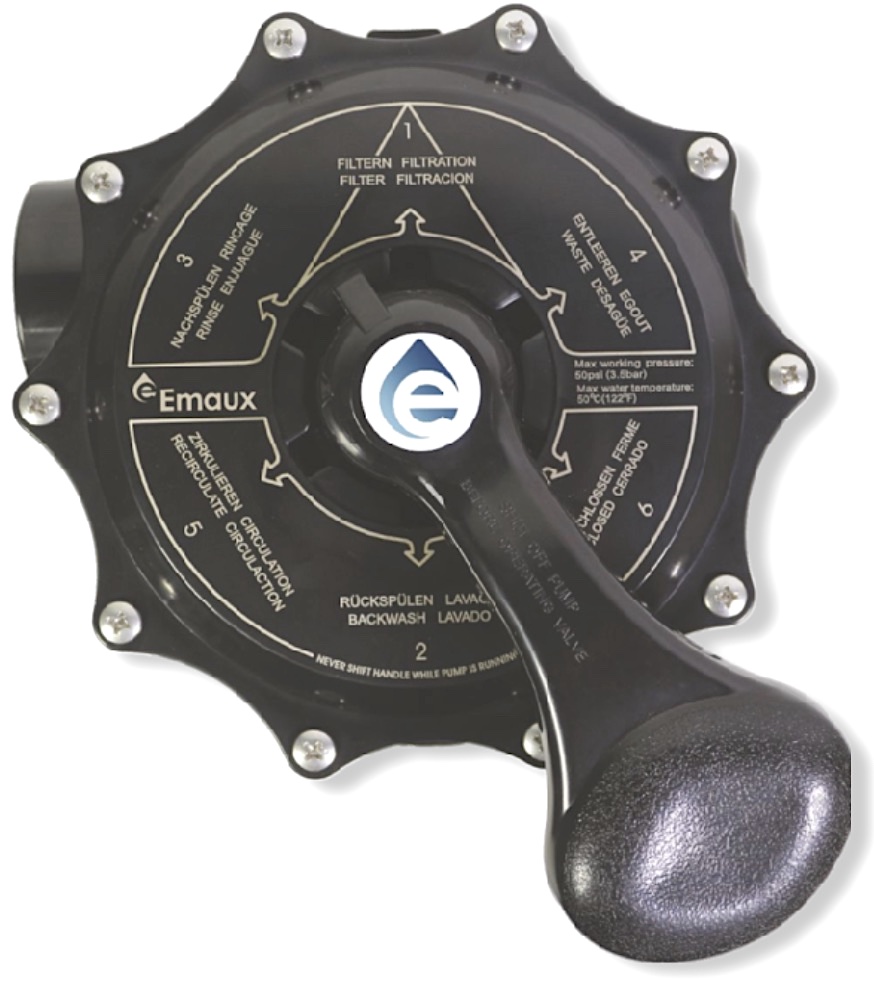
The multi-port valve is the heart of your FILTRATION system.
Most Emaux MPV (multi-port valve), sometimes called a diverter valve or a backwash valve have 6 positions: Filtration, Backwash, Rinse, Waste, Recirculation, and Closed (which is rarely used here). They are an integral part of sand fiiters and diatomacious earth (d.E.) filters.
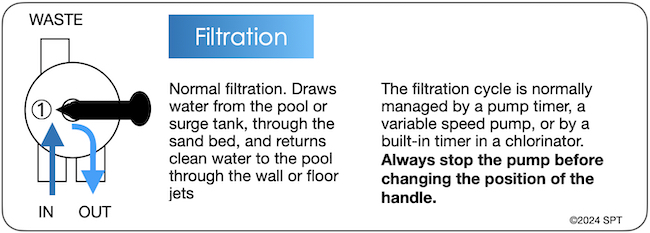
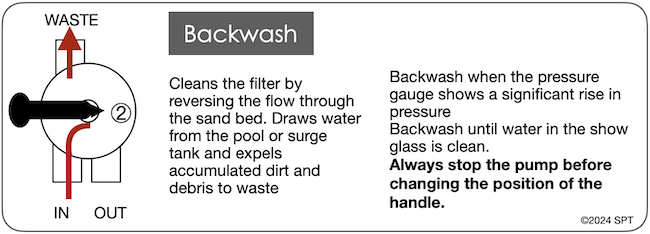
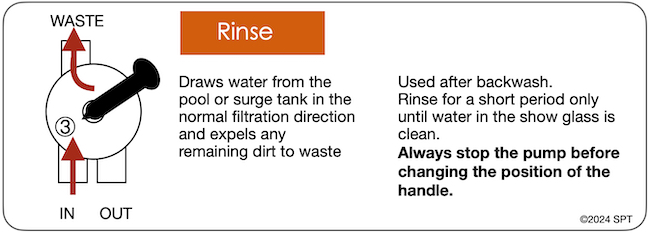
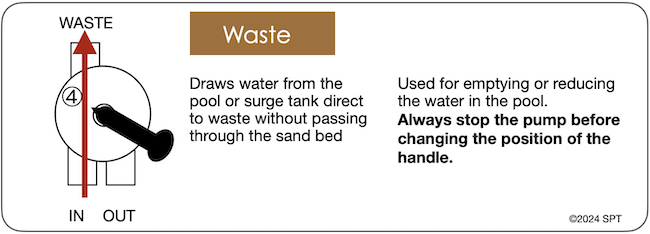
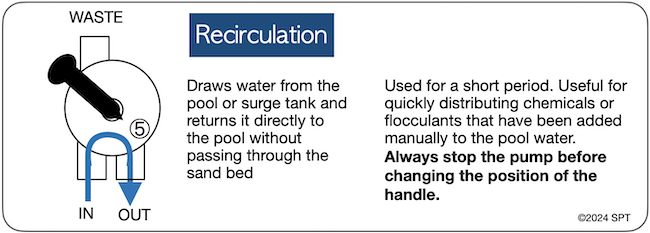
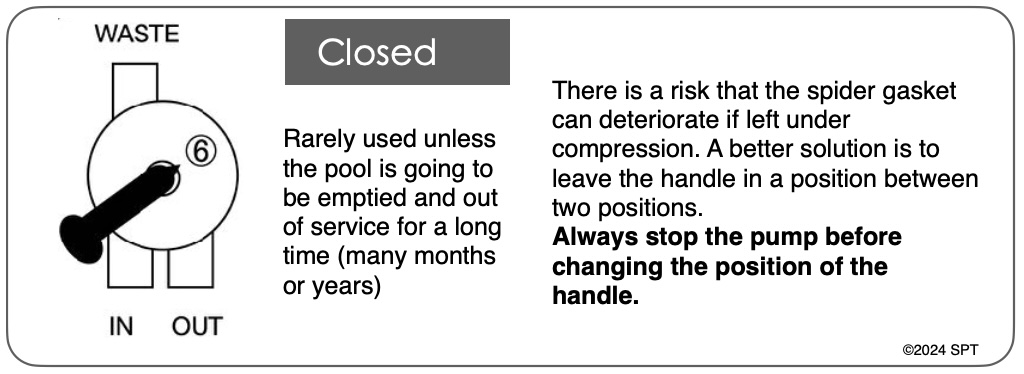
Designed for a relatively light bather load typical of home and family pools, modern cartridge filter elements offer a performance close to that of glass filled sand filters with the convenience of sand but very low on maintenance. They are user and environmentally friendly, and due to their small footprint they take up very little space in a pump room. Cartridge filters come in many sizes and offer the smallest of any kind of pool filter making them ideally suitable for folding above ground pools and inflatables. Larger sizes will treat traditional pools up to 250 m³, especially those that do not have a heavy bather load.
Cost
Cartridge filters are the least expensive. The filter element itself represents the largest part of the price of a cartridge filter system. Even taking into account the cost of occasionally changing the filter element, the absence of moving parts and selector valves means they will last a lifetime.
Maintenance
Keeping a cartridge filter in good condition is the easiest of all kinds of filters. There is no backwashing to be done, simply relying on the increase in pressure shown by the pressure gauge is sufficient to know when to remove the element and clean it, but periods between cleaning should not be longer than 6 months. Cared for correctly, a filter element can last for up to 2 years or more.
Advantages & Benefits
Due to needing very little plumbing, the ease of installation is an important consideration. Because they require no backwashing, cartridge filters do not incur a waste of water with the expensive chemicals in it and they are therefore very user and environmentally friendly. There is no need for the use of dangerous substances for regenerating the media and cleaning the element is a simple matter of using a garden hose with a nozzle at normal household water pressure.
Downsides
To enjoy the full benefit of the low maintenance, it's important to maintain a correct water chemistry in order to avoid attacks of algae or other causes of discoloured or cloudy water. If it becomes necessary to use a flocculant to clarify the water, to avoid clogging the mesh of the paper pleats a product must be used that is specially designed for cartridge and D.E. filters. After such a treatment, the filter element must be removed and thoroughly cleaned.
Diatomacious Earth (DE.) filters
The filtration properties of diatomacious earth have been known since the antiquity. Nowadays D.E. pool filters are largely outdated due to their high price, advanced designs of low maintenance ,high-rate sand filters, special filter media, and efficient cartridge fillers.
Cost
Pool builders and pool stores will recommend them to new customers because they are expensive and make the best profit - and get a captive customer for D.E. powder. Aggressive marketing for years has monopolised the North American market for some brands for so long that even many pool builders often don't realise or bother to understand how much more time saving, water saving, and environmentally friendly sand and cartridge filters are. Compared to all other filtration methods D.E. filters may well be among the most efficient, but are the most expensive by a wide margin.
Maintenance
D.E. filters are the messiest and most highly maintenance intensive of any kind of pool filter. They should be disassembled and thoroughly cleaned once a year and the grids inspected for wear and tear and The cost of replacement grids is high. Replacing the grid cloth may be more economical but is very time consuming.
Cost/Benefit D.E. vs sand, glass, and Zelbrite
The level of filtration provided by sand, about 15 microns, is more than adequate for any domestic pool up to about 100m3 (26,500 gal) that has a light bather load of an average family and a occasional poolside barbecue party. For heavier bather loads, a sand filter filled with Zelbrtte (a "clinoptilolite" zeolite), will not need the media changing for a decade and with its 3 micron filtration surpasses the performance of D.E. Glass media is cheaper than Zelbrite and will also last for many years. Changing normal silica sand every three years is a day's work but far less of a challenge than taking a D.E. filter apart and putting it all together again. Sand filters cost only a fraction of the price of the D.E. filters which have now largely gone out of fashion outside the US.
Use in commercial and community pools
There may be an argument for using D.E. filters with very big or commercial pools with a heavy bather load where the maintenance budget is not a handicap and full time staff keeping the pool and its systems running. D.E. powder is a health hazard for the eyes and lungs, ans a carcinogen; people working with it regularly should wear protective clothing and a face mask.
Products and Help pages Products and other Info pages
Complete Guide for swimming pool chemicals in Thailand
Flocculants in our online store
About Dolphin robots
Dolphin robots in our online store
Disinfection systems
Water softening systems
Chlorine Guide
Copyright ©2021-2024 Swimming Pools (Thailand) Ltd. All rights reserved.
Panier
Promotions
-
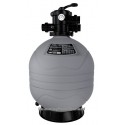
-
Emaux MFV27A. Top Mount 27"
฿ 12,514.02 ฿ 8,624.02
Information
- Livraison
- Paiement
- Conditions d'utilisation
- Jours fériés en Thaïland 2026
- Swimming Pools Thailand en Laos
- FAQ
- Ko Tao agency
- Construction de piscines en Thaïlande
- Correct chlorine and pH levels recommended for Swimming Pools in Thailand
- Choosing your swimming pool pump at Swimming Pools Thailan shop
- Ionzers
- Privacy policy
- cookies
- SwimmingPoolsThailand chemical guide
- Que choisir pour charge filtrante?
- Salt water pools
- The EMAUX guarantee
- Testimonials
- Why are Dolphin robots so popular?
- ioniseur de piscine
- ClearBlue - additional advice

